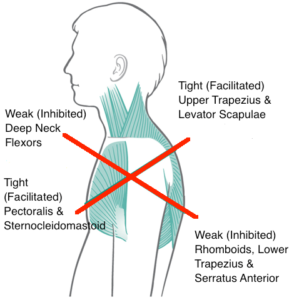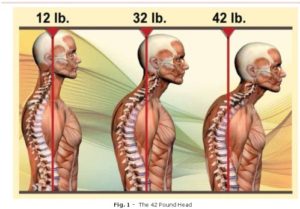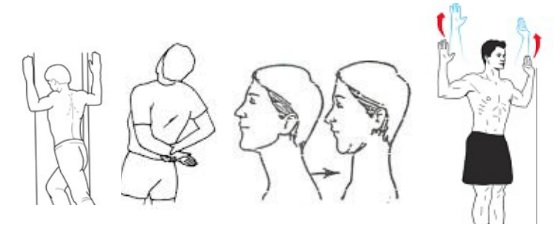Unlock the Power of Your Workforce
Maximize Your Team's Potential with our Human Performance Solutions
Desk Jockies Listen Up! You Most Likely Have Upper Crossed Syndrome
Upper Crossed Syndrome – Causes, Risks & Remedies
Causes
Upper crossed syndrome (UCS) is a very common muscular imbalance involving the upper portion of the torso.

Assessment
Relax your upper body. Freeze. Moving just your head, look down at your hands. Are you looking at the backs of your hands or are your thumbs facing forward. If the backs of your hands face forward you mostly likely have this muscular imbalance.
Implications

Remedies
Correcting UCS can be accomplished with increased flexibility and strength. Flexibility of the chest, shoulders and anterior neck are key. One of the best moves for flexibility is the doorway stretch (shown below). Try this at home, holding for at least 30 seconds and repeating twice. A neck stretch that can be done anywhere is also shown below. Strengthen the weak muscles of the upper back and neck with chin tucks and wall slides (also shown below). For the best results, repeat these exercises and stretches and at least 3 times a week.
About SiteWell Solutions
SiteWell Solutions is committed to supporting business and organizations with health, wellness and injury prevention services. A healthy workforce is proven to be more engaged, productive and happier. It is our mission to deliver these outcomes to every organization we serve. Our services include onsite and virtual corporate wellness programs, industrial athlete training, injury prevention services, chronic disease management, employee resilience support services and much more. Contact info@sitewellsolutions.com today to find out how we can optimize your organization.
Health tips in your inbox
Our Services
Get in touch
Call us at +1 (321) 300-4338
Terms & Conditions | SWS App Privacy Policy
© SiteWell Solutions | 2025 All rights reserved
Site design by WebXDesigner.com
